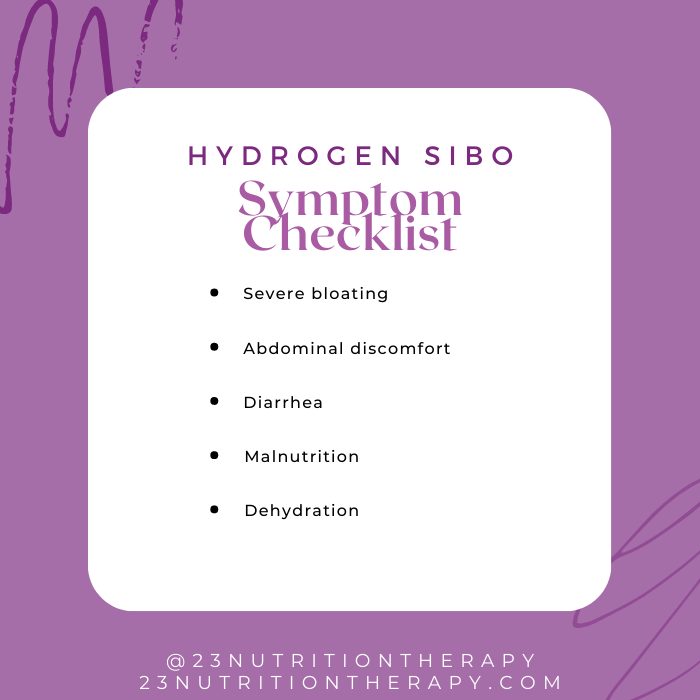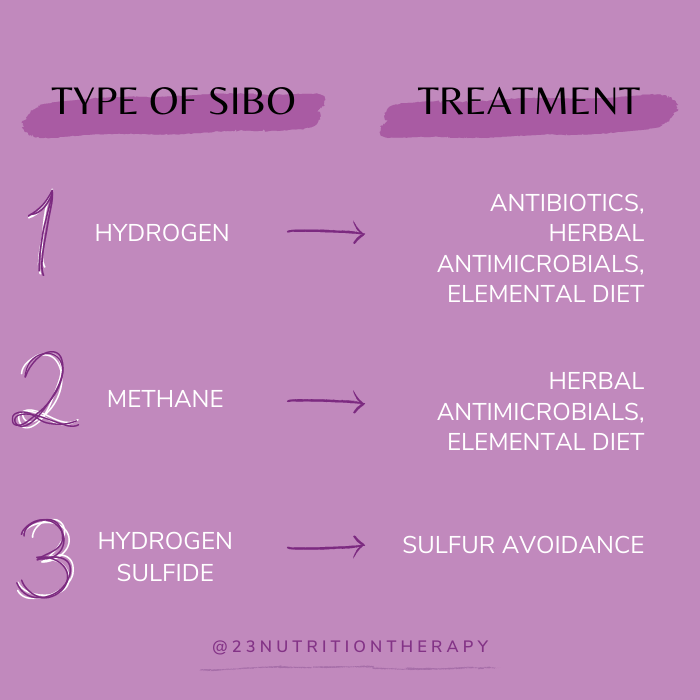If you’re reading this, you probably know a little bit about what SIBO is and you may think that you have it. But simply thinking that you have SIBO isn’t enough to determine what happens next. The next step is to test for SIBO in order to determine if it is actually present (test, don’t guess!). And if you do have SIBO, what type of SIBO do you have? Knowing what type you have is the first step to understanding how to heal SIBO.
There are 3 general types of SIBO, which are categorized based on which gas the microbes are producing in your small intestine.
The 3 types of SIBO (small intestinal bacterial overgrowth) are:
- Hydrogen SIBO
- Methane SIBO
- Hydrogen sulfide SIBO
Each of these types of SIBO require a different approach when it comes to treatment, so knowing which kind you have is extremely important! Keep in mind; it is absolutely possible to have multiple kinds of overgrowth at the same time.
You will often see the 3 SIBO types written as “hydrogen-dominant” or “methane-dominant” because it is possible to have both but one is more dominant than the other.
How to heal SIBO completely depends on which kind or combination you have. So, staying in continuous contact with your functional medicine dietitian is vital to make sure your treatment protocol is the correct one for you!
Hydrogen SIBO

This is the most common type of SIBO. These bacteria produce hydrogen gas by fermenting carbohydrates in the digestive tract.
Signs and Symptoms of Hydrogen SIBO
The large amounts of gas that they produce can lead to severe bloating and abdominal discomfort, which can worsen as the day progresses.
The bacteria also produce serotonin, which increases the contractions of the small intestine. The increased frequency of contractions in the small intestine leads to a decrease in gut transit time, which results in diarrhea.
There is also another mechanism at play here that leads to faster movement through the bowels and diarrhea. Toxins released by these bacteria can irritate the gut lining, draw more water into the bowel, cause more contractions, and ultimately result in diarrhea.
It is also possible that you don’t experience diarrhea at all, and don’t experience any other symptoms.
The reduction in gut transit time also contributes to malnutrition due to the malabsorption of nutrients, because there is simply less time for the nutrients to be absorbed. The loss of liquids and electrolytes is also an issue and can lead to dehydration.

Treating Hydrogen SIBO
Hydrogen dominant SIBO responds well to antibiotics (usually rifaximin), herbal antimicrobials, and the Elemental Diet. Your functional medicine dietitian will evaluate your best course of action based on your medical history.
Methane SIBO

This type of SIBO is the second most common. Methanogens produce methane from hydrogen gas and carbon dioxide. Technically, these microbes are archaea and not actually bacteria.
There is some discussion of renaming this SIBO type to IMO (intestinal methanogen overgrowth). This name change would account for the fact that the methanogens are not bacteria. Additionally, methanogens can actually overgrow in all areas of the colon. This why SIMO (small intestinal methanogen overgrowth) isn’t the proposed name.
The potential name change highlights the fact that this SIBO type is different than the rest and requires a different approach to treatment.
Signs and Symptoms of Methane SIBO
A common sign of an overgrowth in these archaea is chronic constipation. High amounts of methane can contribute to increased transit time within the digestive tract. The longer time food spends within the colon causes constipation. It is also possible to have diarrhea with this type, but this is less common.
Weight gain and increased body fat is also a common sign of methane dominant SIBO. This is partially due to the longer gut transit time that makes food sit in the gut for longer periods of time, allowing more calories to be extracted and absorbed.
Another reason is because archaea make more calories available to us in the gut by breaking down fiber, which we normally cannot digest by ourselves. This is the same reason cows can survive on grass alone!

Mixed Type: Methane SIBO and Hydrogen SIBO Combined
Since methanogens require hydrogen gas to produce methane, it is common to find this type of SIBO in combination with hydrogen SIBO.
It is thought that the hydrogen type can lead to an overgrowth of methanogens because it provides tons of hydrogen gas that the methanogens need! In this situation, it would be considered mixed type SIBO.
Treating Methane SIBO
Methane SIBO can be much harder to treat than hydrogen SIBO because archaea do not directly respond to antibiotics. Remember – archaea are not bacteria!
If these archaea are being fed by an overgrowth in bacteria that produce hydrogen gas, antibiotics can potentially be useful to get rid of one of the components that the archaea need. Antibiotics kill off the bacteria that produce the hydrogen gas, thus starving the archaea.
For this type of SIBO, it can be more beneficial to approach treatment with herbal antimicrobials or the Elemental Diet
Hydrogen Sulfide SIBO

This type of SIBO is a bit different from the first two. Hydrogen sulfide (H2S) is a gas that is actually produced by the human body! H2S is produced throughout the GI tract in a healthy body. In healthy levels, H2S helps to maintain the integrity of the gut lining. However, in excess amounts H2S is actually considered a neurotoxin.
With hydrogen sulfide SIBO, this normally beneficial gas is being produced in levels that are toxic! Too much H2S can lead to nerve damage, chronic gut inflammation, and DNA damage that can lead to colon cancer. The intestinal barrier can become leaky, which increases inflammation and causes other issues. Too much hydrogen sulfide can lead to immune suppression, laying the groundwork for chronic infections.
Excess hydrogen sulfide can also inhibit cellular respiration in mitochondria. Cellular respiration is the process in our cells that pulls the energy out of what we eat!
People with this type of SIBO usually feel sicker overall because of the systemic issues that result from the damage to our mitochondria. Without the ability to convert food to energy, cells can die and tissue death becomes a possibility. This also means that you aren’t receiving energy, and can result in chronic fatigue syndrome.
Signs and Symptoms of Hydrogen Sulfide SIBO
Diarrhea and constipation are both possible symptoms, depending on whether other types of SIBO are present. Abdominal pain and sensitivity are also extremely common. You may also experience gas that smells like sulfur, or rotten eggs. Halitosis (bad breath) and gum disease can also be the effect of excess hydrogen sulfide.
The non-GI issues that can arise due to the neurotoxic effects of hydrogen sulfide can include:
- Body pains
- Increased food sensitivity
- Tingling in hands or feet
- Sensitivity to light and sound
If you have hydrogen sulfide dominant SIBO, this doesn’t necessarily mean that you would be experiencing all of these symptoms at once.

Testing for Hydrogen Sulfide SIBO
With all of the possible issues hydrogen sulfide SIBO can cause, it is obvious how imperative it is to identify this type of SIBO. Unfortunately, this type is not currently testable by all testing methods, but that should change in the near future…
Update: there is a new test called Trio-Smart that has recently become available, and it is the only SIBO test that currently tests for all 3 types. There is some debate about whether or not this test is accurate.
There are ways for your functional medicine dietitian to make an educated guess on whether you have hydrogen sulfide SIBO from the current breath tests, but it is not a foolproof method.
About 1 in 10 SIBO cases are due to hydrogen sulfide-producing bacteria. Hopefully someday soon we will be able to test for H2S in a simple and effective way.
Treating Hydrogen Sulfide SIBO
How to heal SIBO caused by H2S-producing bacteria is different from the other types. Sulfur is needed for this gas to be produced, and we obtain that from certain amino acids in our diet. If you have this type of SIBO, avoiding foods and supplements that contain sulfur is essential for recovery.
Unlike the hydrogen and methane types, this type of SIBO cannot be treated with the Elemental Diet because the medical beverage contains these sulfur-based amino acids.
A completely different treatment approach is required for hydrogen sulfide SIBO and should be advised by your functional medicine dietitian.
The Importance of Knowing Your SIBO Type
Knowing the type of SIBO you have is extremely important. Without knowing the specific SIBO type, you will not know which type of treatment would be most beneficial. It is essential to know the type of SIBO you have to truly understand how to heal SIBO.
If you’re suffering from SIBO, you will want to pursue the most effective treatment protocol based on both your type of SIBO and your medical history, guided by your functional medicine dietitian.
Also, retesting after a SIBO treatment protocol is very important because these three types of SIBO can be interrelated. This can sometimes mean that you can get rid of one type of SIBO with the potential of having a second type remaining.
Many times you can have more than one type at once, but one type is suppressed (often the hydrogen bacteria). Hydrogen sulfide and methane both use hydrogen in order to thrive, so getting rid of either of those types might mean you’re left with hydrogen SIBO after treatment.
Now you understand why knowing your SIBO type is so important for laying the groundwork for proper treatment for healing SIBO. Working with a healthcare professional who is familiar with SIBO and who understands how to heal SIBO and all its variations will give you the best results.
Once you know which type of SIBO you have, you are one step closer to recovery! Schedule your appointment today to continue your journey to better gut health.




